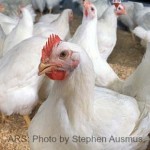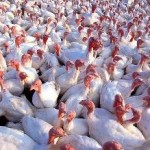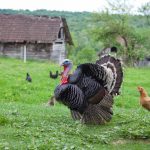The Canadian Food Inspection Agency (CFIA) has placed restrictions on poultry imports from the United States because of the highly pathogenic avian influence (HPAI) outbreak in that country. All raw poultry and poultry products and by-products that are not fully cooked, including eggs and raw pet foods, that are sourced, processed, or packaged from these states are under restriction. The states include: California, Nebraska, Idaho, North Dakota, Indiana, Oregon, Iowa, South Dakota, Kansas, Washington, Minnesota, Wisconsin, and Missouri. Arkansas and Montana were on the list, but those states are now free of HAPI and imports are permitted. Restricted items include live birds, hatching eggs, eggs, yolks, egg whites, poultry meat, raw pet foods containing poultry products, feathers, … [Read more...]
CDC Issues Human Health Advisory Over Avian Flu
The Centers for Disease Control and Prevention (CDC) has issued an official health advisory about recommendations for human health over the highly-pathogenic avian influenza A (H5N2), (H5N8) and (H5N1) viruses, known as HPAI H5. There have been more than 200 findings of birds infected with these viruses. More than 40,000,000 birds in 20 states have been affected, mostly in poultry backyard and commercial flocks. These are the first reported infections with these specific viruses in U.S. wild or domestic birds. No human illnesses have been reported to date, but since the virus has been found in this country, the advisory states "their appearance in North American birds may increase the likelihood of human infection in the United States." Human infections with avian flu have occurred … [Read more...]
Consumers Will Pay More for Eggs Because of Bird Flu
The highly-pathogenic avian influenza has spread across the central United States, killing about 39 million chickens, turkeys, and other birds since December 2014. This will affect egg supplies and prices, and may even affect prices for Thanksgiving turkeys this fall. Goldman Sachs reports that U.S. consumers will probably pay $8 billion more to buy eggs this year. That is an increase of at least 75% from last year. Corporations that buy eggs in bulk will also spend much more money. Large chains are concentrating on securing egg supplies. According to the American Egg Board, U.S. consumers ate almost 260 egg per person last year. The bird flu was introduced into this country by wild migrating birds, according to the World Organisation for Animal Health. If the virus moves east, the … [Read more...]
Human Protection Considered as H5N2 Avian Flu Spreads
The highly contagious avian flu H5N2 is spreading rapidly in some parts of the midwestern United States. As a precaution, farm workers are being offered antiviral medication as a preventative measure. The flu has not affected people yet, but it can mutate and make the jump from birds to humans. The spread of this virus from person to person is very rare, and has not been sustained over time. But if the virus mutates, person to person transmission could occur. The symptoms of this illness in people include fever, cough, sore throat, muscle aches, and conjunctivitis of the eye. Lower respiratory illness, including pneumonia, have occurred. Sometimes, nausea, abdominal pain, diarrhea, and vomiting can occur. Lab testing is required to establish a diagnosis. The virus has sickened … [Read more...]
Avian Influenza Discovered in Minnesota Turkey Flock
The USDA has confirmed the presence of "highly pathogenic" H5N2 avian influenza in a commercial turkey flock in Pope County, Minnesota. This is the same strain that was found in backyard and wild birds in Washington, Oregon, and Idaho. Samples from the turkey breeder replacement flock were tested at the University of Minnesota Veterinary Diagnostic Laboratory and APHIS National Veterinary Services Labs in Ames, Iowa. State officials have quarantined the premises and poultry barns within a 10-mile radius around the farm. The remaining birds on the property will be destroyed. Birds from the flock will not enter the food system. Almost 15,000 turkeys were destroyed; an additional 29,000 will be killed. A qua The CDC considers the risk to people to be low. No human infections have been … [Read more...]
Avian Flu Discovered in Wild Birds in Washington State
The USDA released a press bulletin stating that highly pathogenic H5 avian influenza has been confirmed in wild birds in Washington state. The virus H5N2 has been found in Northern pintail ducks. This virus has decimated poultry farms in Canada and Asia. No bird flu virus has been found in commercial poultry in the U.S. and no human cases have been detected in the U.S., Canada, or internationally. The government stresses that the birds are safe to eat if they are "properly handled" and cooked to 165°F as verified with a meat thermometer. Therein lies the problem. The sick birds were in Whatcom County, Washington. Two strains were found: H5N2 in the ducks and HPAI H5N8 in captive Gyrfalcons that were fed wild birds killed by hunters. USDA is working with the U.S. Department of … [Read more...]
Nine Farms Affected by Avian Influenza in British Columbia
A total of nine farms have now been affected by avian influenza H5N2 in British Columbia, Canada, according to the Canadian Food Inspection Agency (CFIA). The Fraser Valley farms are close to the farm where the outbreak began. This particular strain of the bird flu virus is highly pathogenic and very contagious. The province of British Columbia has notified the CFIA of another farm where the illness is suspected; this outbreak was confirmed and is the ninth infected farm. The government is tracing movement in and out of these sites. Birds have been humanely euthanized on four farms, and depopulation activities began this week on the fifth farm. Almost 200,000 birds have been euthanized. The CFIA is urging poultry farmers to take an "active role" in protecting their flocks by using … [Read more...]
Canada Sets Control Zone to Prevent Avian Flu Spread
The Canadian Food Inspection Agency has established a primary control zone in the area where the highly pathogenic avian flu H5N1 has been infecting flocks. The Province of British Columbia is working with the CFIA to implement it. Southern British Columbia has a high concentration of poultry operations. The control zone is divided into three disease zones: Infected, restricted, and security. Those zones represent relative levels of risk. The outer boundary of an infected zone is up to 3 km from any known infected premises. The restricted zone is established surrounding the infected zone and measured based on the epidemiology of the disease. And the security zone is the remainder of the primary control zone beyond 10 km. The restrictions apply to captive birds, which includes but is … [Read more...]
Avian Flu in Canada “Highly Pathogenic”
The Canadian Food Inspection Agency (CFIA) has just released a statement saying that testing has confirmed the avian influenza outbreak on two farms in Fraser Valley is the highly pathogenic H5N2 virus. And preliminary testing has bound that two other farms in British Columbia are "presumptive positive" for H5 avian influenza. Those two farms have been quarantined. Those two new farms received birds from one of the original farms that is infected. When raw poultry is properly handled and cooked, there is no risk to humans. In addition, avian influenza only rarely affects people who do not have consistent contact with infected live birds. Still, cook any poultry thoroughly to 165°F as measured by a food thermometer and be careful to avoid cross-contamiantion between raw poultry and … [Read more...]
Avian Flu is Back in Asia and Canada
The avian flu is making a comeback as winter approaches. An outbreak of the bird flu in Korea last spring resulted in the culling of half a million birds. In Egypt, a seventh person has just died from an H5N1 infection. And the Canadian Food Inspection Agency has confirmed that avian influenza has been found in birds on two farms in Fraser Valley. Human cases of the bird flu are rare, and usually only affect people who have close contact with live poultry. Egypt's cases have been localized in poor areas where people keep and slaughter poultry in their homes. The bird flu has also been reported in the Netherlands, Germany, Britain, India, and southeast Asia. In Canada, the two farms have been placed under quarantine. The actual subtype and strain of the virus is not known; testing is … [Read more...]










